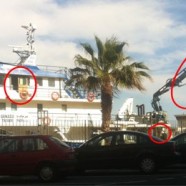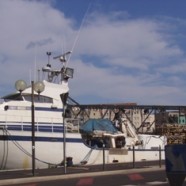Crabs Pinched by PCB
The port of Rouen wants to open a new disposal site for the sludge from dredging in the Seine’s bay. The public inquiry was closed yesterday. This 2 million meters³ “experience” covers itself in scientific fuss like the follow-up of the bioaccumulation of toxic elements contained in the sludge, thanks to the placing of 7 cages of mussels laid 2 to 10 km from the disposal site. This animal experimentation led by Ifremer is totally useless in regards to the ecological disaster that strikes a blow from heavy metals and PCB, endocrinal disruptors, at the ensemble of the Seine’s bay from the east to the west and from the top to the bottom.
Fish Eat Whales
The 63rd annual meeting of the International Whaling Commission (IWC) will take place from July 11th to 14th on the Channel Island Jersey.
Pro-whaling countries often state that whales must be culled to avoid competition with human fisheries. Japanese “scientific” documents show images of whales’ stomachs overflowing with small pelagic fish. According to Robin des Bois a defender of whales, one must continue to demonstrate that whales have positive effects not only on the world’s marine ecosystem but on all ecosystems. We cannot accuse whales of taking all and giving nothing to the oceans, while it is Man who takes all and gives nothing but pollution and increasing disturbances.
Libya still Manages their Embassy in Sète
Despite the current conflict and the break in diplomatic relations between France and Libya, the city of Sète and its tourist heart continue to represent Libya, as always without problem, the regime of the famous colonel. Ten tuna fishing boats proudly claiming their homeport and their administrative and financial connections with Tripoli adorn the streets and terraces of the cafés. The riverboats in Sète departing the old city’s bridge leave to the right a part of the Libyan fleet while declaiming through a megaphone, “Since forever the tuna fishing boats of Sète fish for bluefin tuna exclusively in the Mediterranean.”
The radioactive contamination of fish
The French and European authorities don’t appear to have grasped all the difficulties raised by the control of fish and other seafood products likely to have been contaminated by atmospheric deposits and liquid radioactive matter in the coastal and deep sea regions of the North West Pacific. This is the most productive area in the world. It is exploited by fleets from Japan, China, South Korea, Taiwan and Russia. IUU fishing – illegal, non-declared and non-regulated – is very active here.
Global catches are approximately 20 million tonnes per year. Catches of Japanese anchovy and mackerel reach 1.5 million tonnes and 900 thousand tonnes per year respectively. Squid, cuttlefish and octopus catches are in the order of 1 million tonnes per year, and Japanese calamari and scallops are in the order of 1 million tonnes and 200 thousand tonnes per year respectively.
Bigeye Tuna is in the Red
Not the Same Old Tuna – #5
The International Commission for the Conservation of Atlantic Tunas and its adjacent seas – ICCAT.
17th -27th November Paris
The bigeye tuna in the Southern Atlantic grows quickly: 105 cm at 3 years old, 140 cm at 5 and 163 cm at 7. But it is disappearing even faster. The Gulf of Guinea houses the principle spawning ground, however the last assessment of bigeye tuna was taken in 2007, and the latest fishing figures date from 2005. Yet the contracted parties, notably the fishing states, were not in agreement over a project supported by the USA, the EU, and Japan, who would have imposed an onboard observer program and a 2 month suspension of all fishing activity. According to the Scientific Committee, “the bigeye tuna situation is worrisome.” The situation could deteriorate quickly with the movement of purse seine and longline vessels from the Indian Ocean to the Southern Atlantic over fear of piracy. Illegal fishing activity is suspected to be prevalent in this fishing ground and the total admissible catch for 2011 is set at 85,000 tons.
Where Are They Now?
Not the Same Old Tuna – #3
PA – 2, The International Commission for the Conservation of Atlantic Tunas and its adjacent seas – ICCAT.
17th -27th November Paris
During the Panel session number 2, responsible for the conservation of bluefin tuna, the fate of the ships announced as “removed” was often mentioned. The EU, for example, announced that 126 purse seine vessels and 130 longline vessels have been “removed” from the bluefin tuna fleet between 2008 and 2010, without giving precise information on the ships’ demolition, conversion or any other mode of decommissioning. Contracting parties from the Eastern Mediterranean also announced the “removal” of fishing boats and tugs assigned to transporting cages without providing detailed information on their demolition or their redeployment for another purpose.











